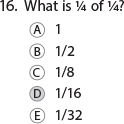Web Page: Different Types of Exam Questions
You use a ruler to measure the length of something, a thermometer to measure its temperature, a scale to measure its weight, and so on. An exam is also a measurement tool, designed to measure your knowledge and thinking in specific ways. The types of questions on an exam target different types of thinking. Here are the typical question types:
Objective questions—multiple choice, true/false, fill in the blank, or matching—have specific correct answers. Exams that feature these types of questions often have you provide answers on a bubble sheet—a page with letters in circles that you need to darken. |  |
Short-answer questions ask you to complete a sentence, write a sentence or two of your own, or supply a short answer. These questions may require a specific correct answer or ask you to reflect on your own experience. |  |
Essay questions require you to share your thoughts or knowledge about a specific topic, asking you to state a thesis and support it with details. You may be prompted to provide information, argue for a point, reflect on an idea, compare two concepts, tell about an experience, or respond to a piece of literature. | Writing Prompt Think of a career that you would like to pursue. What qualities do you possess that make you well suited to this career? Where might you go for an intern experience? Write a letter to a business owner, convincing the person to offer you an internship. |
Your Turn Reflect on the question types listed above. Which type do you prefer? Why? Which is your least favorite? Why? Now page forward in this chapter and look for a strategy that could help you improve your performance on the type of question that is most difficult for you.
Web Page: Different Types of Exam Questions
© 2014 Thoughtful Learning
